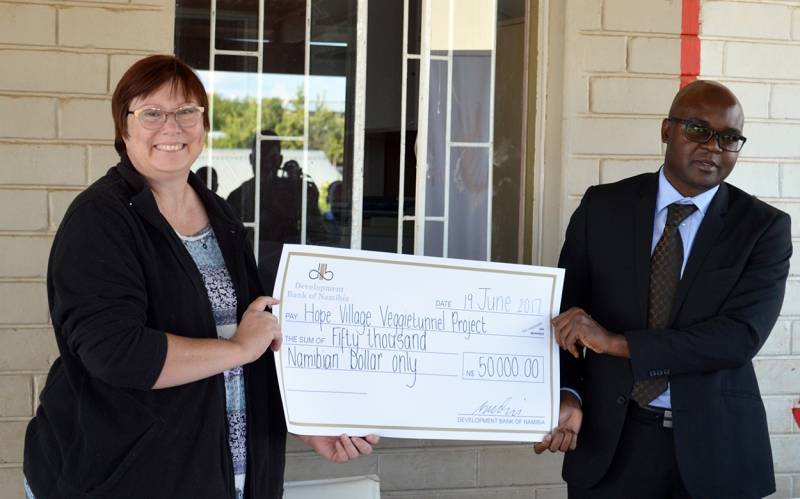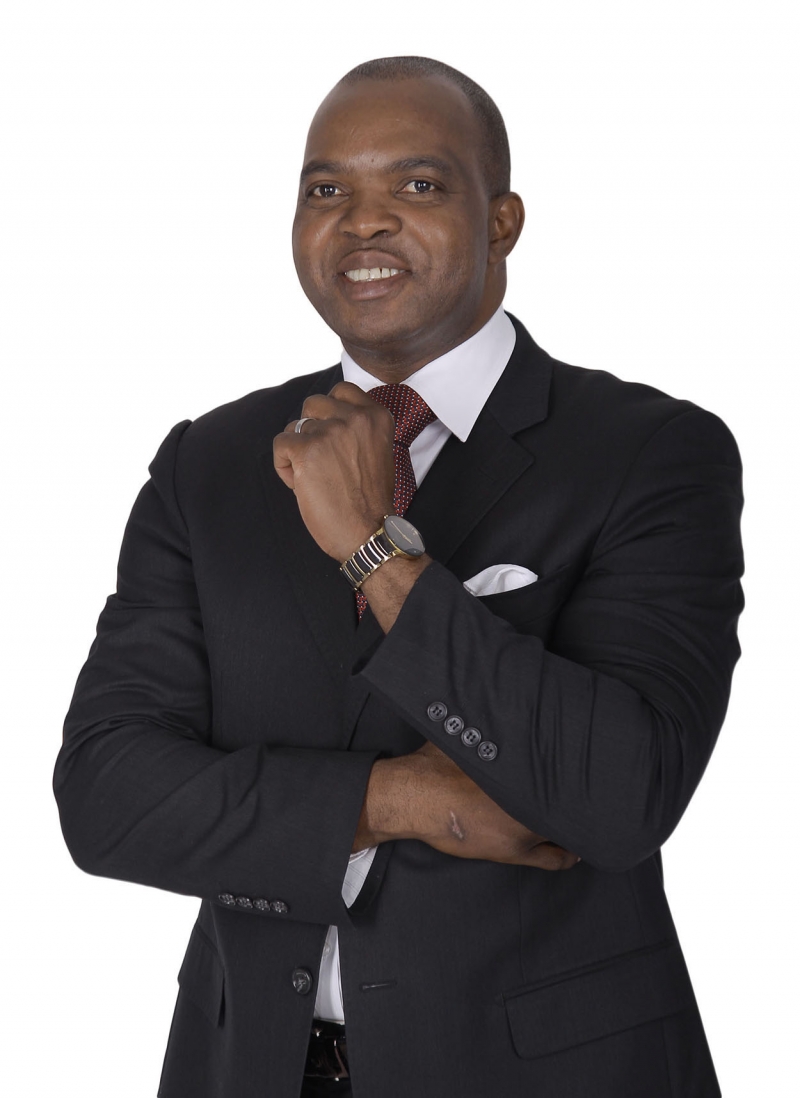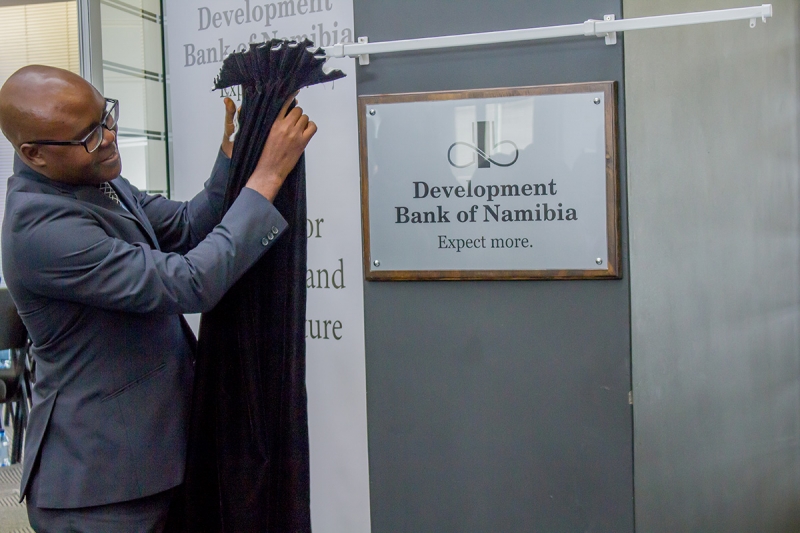 Call 061 290 8000
Call 061 290 8000 Click to mail us
Click to mail us FAQs
FAQs

Seed capital for Hope Village vegetable growing Development Bank of Namibia funds two Veggietunnels
Jun 20 2017The Development Bank of Namibia (DBN) has made a donation of N$50,000 to Hope Village in Greenwell Matongo, Windhoek. The amount will be used to erect two Veggietunnels to cultivate vegetables, irrigation for the tunnels and supplies to establish cultivation in the tunnels.
Speaking about the donation, DBN CEO Martin Inkumbi said not all projects are able to benefit from the commercial approach that the Bank takes. To support projects of that do not qualify for traditional loans, the Bank sets aside a portion of its profits for corporate social investment.
The Hope Village Veggietunnels are what the Bank considers an excellent investment. Although DBN will not measure it in terms of financial returns, the Veggietunnels will create significant benefits for the children of Hope Village, the community of Greenwell Matongo and the future of Namibia.
By growing its own food, Hope Village will reduce its requirement for financing from external sources, and will be able to have greater security by providing sound nutrition for its family in a sustainable manner. Teaching children how to grow their own food, he added, makes them sustainable in later life. With the knowledge that food can be grown at home, the Bank hopes that they can become future producers for themselves, for their families, friends and communities.
Hope Village says that, in addition to food for the children, surplus produce will be sold to the community of Greenwell Matongo, and the project will create employment opportunities.
Inkumbi said a large part of urban Namibians do not have access to agricultural land or the means to produce food, and many lack the skills. Their experience of agriculture is that it is an exchange of cash for bags of fruit and vegetables. If the cash or produce is not available, nutrition is restricted.
He went on to say that DBN has implemented an environmental and social management system that promotes the wellbeing of people and the environment. The donation is informed by the Bank’s concern for both those aspects, now and in the future.
Inkumbi concluded by saying that DBN expects more from the future, and the donation is an expression of that hope.
In the wake of recent reports of lapses in repayment of debt on small and medium enterprise loans issued with the purpose of enhancing Namibia’s development, economic activity and prosperity, DBN Senior Communication Manager Jerome Mutumba has clarified important aspects of mutual responsibility for lending and borrowing, which must be factored into the concept of development finance.
Mutumba says that there is a distinction between finance for development and commercial finance. Finance for development will typically be allocated with the goal of supporting and enhancing economic activity, while commercial finance will have the goal of achieving returns for the lender, without the narrower requirement of producing development. Both, however, will have the prerequisite of returns to capital, in order to sustain their operations. In the event of loans which are not repaid, both development and commercial finance will fail.
In making the choice between sources of commercial or development finance, the borrower will envisage the same outcome, regardless of the source of finance: a viable enterprise that will be a source of personal growth and income. The choice of lender, on the other hand, may influence the terms of the loan in favour of the borrower. A development finance institution (DFI) may, for instance, accept a greater degree of risk, offer capacity development services to borrowers and, under exceptional circumstances, offer flexibility on contracted terms of repayment.
In order to qualify for a DFI loan, the borrower has to recognise the goals of development finance, and ensure that she or he can fulfill those requirements. The first cut decision of development finance will be a clear indication that the borrower can satisfy the terms of the loan. If not, the borrower will not be able to satisfy development goals, such as employment, development of capital, economic activity and other factors.
As a lender, the DFI will have the additional consideration of its own sustainability. It has the moral and economic obligation to preserve its own capital, as well as collect interest, which will be used to sustain and grow its operational capacity, by providing more loans to a greater number of borrowers.
In this way, the agreement between the borrower and the DFI must be mutual, to produce the best possible outcome for both.
Mutumba points out that as the benefits of development finance are allocated from a common resource, such as the national coffers, with the broader goals of development benefits that extend beyond the owner and the DFI, the finance is at the heart of an ubuntu in which the benefit extends beyond the two parties to the loan. Both entities have to be aware of the ubuntu.
Talking about the successful approach of the Development Bank of Namibia (DBN), Mutumba says the Bank not only ensures the integrity of its lending through governance, but also through cooperation with borrowers after the amount has been disbursed.
Governance surrounding the lending process is exercised through a stringent due diligence process prior to approval of loans, which includes factors such as qualification and skills, and willingness to offer collateral, in addition to the standard elements of business planning and development impact.
Mutumba stresses that development finance is a privilege, and that not all applications can succeed, only those that deliver the greatest impact in terms of the Bank’s mandate. Although the Bank may receive many good applications it regretfully has to reject some in favour of those that are the best of the best.
Due to the quality of assessments of applications for finance, the diligence process will identify areas of risk. In these cases, DBN recommends mitigatory measures to applicants, or rejects the application. Where a project is judged to have remarkable development benefits, the Bank may choose at its own discretion to assist the applicant with development of the proposal through its Project Preparation Fund.
Post-lending, Mutumba says that the Bank maintains relationships with borrowers. In addition to monitoring of repayment, visits can be used to ascertain that the application of capital disbursed by the Bank is used for the purpose for which it is intended.
When enterprises do experience difficulty, this is generally, rapidly identified by the Bank, at which stage the Bank will approach the borrower to examine the source of the impairment and try to rectify the situation, rather than proceed to declare the amount a bad debt and recover it through a legal process.
The Bank, he says, does not have the intention to immediately recover its capital, rather to strengthen and improve the enterprise to preserve the development impact that was presented in the successful application.
Mutumba goes on to say that when the Bank has experienced difficulty with loans, it is often as a result of a lack of administrative skills and capacity. The Bank, he says, has taken steps to rectify this with the implementation of a client development function which provides capacity building in the form of mentorship and coaching, through a network of experts in various fields on business management.
Mutumba concludes that the Bank’s track record shows that the partnership between it and its borrowers is sound, and provides developmentally beneficial results. However, he challenges stakeholders to use the Bank’s anti-fraud mechanism, if they believe there are irregularities in transactions.
Development Bank of Namibia (DBN) CEO Martin Inkumbi has announced the Bank’s new positioning, “Expect more.” He says the new positioning statement reflects both the Bank’s transformation, as well as its ambition for the future.
In terms of the transformation, Inkumbi says the Bank has grown substantially since its inception, and evolved.
In terms of size, the Bank is now custodian of assets of approximately N$11 billion, a resource which is continually deployed to nurture larger scale projects consisting of enterprise and / or infrastructure. The Bank, Inkumbi says, is expected to play a larger role in finance for development, based on its growing capacity.
He adds, that the Bank has made significant progress in sourcing capital through issues notes and lines of credit from the external private sector and institutional entities.
Concerning evolution of the Bank, Inkumbi says that DBN has adopted mechanisms such as an advanced enterprise-wide risk management framework, as well as an environmental and social management system that better enable it to manage the risks inherent to financing startups in a dynamic economic environment. He adds that the Bank is currently implementing a treasury function to further strengthen its liquidity and capital raising capacity.
In this case, he explains that stakeholders and borrowers may expect more by virtue of a deeper pool of capital, but should also expect robust risk management, in keeping with the Bank’s objective of maintaining financial sustainability. The Development Bank is a national asset, Inkumbi adds, and has the duty to preserve and sustain itself, as well as grow.
In terms of its impact on enterprises, Inkumbi says, in addition to the ability to finance larger projects from a deeper pool of assets, the Bank now gives more support to its borrowers and potential borrowers who require such support through a formalized mentoring and coaching program. He describes this as a combination of advisory services prior to landing, and capacity strengthening and development through a network of business experts.
He says that each enterprise and project is regarded not just as a financial asset, but also as an asset for the Namibian economy, and so the Bank’s philosophy is to provide the additional support in order to mitigate risks that arise after lending, and ensure the long-term viability of the initiative that the Bank finances.
Internally, Inkumbi says he believes that the new positioning will have a galvanizing effect on staff. The Bank, he says, provides an exceptional environment for personal development, and this has been the basis for a high degree of motivation, and high level of expertise. The Bank’s staff are driven by the concept of personal excellence, however, he believes that the new positioning will drive members of the team to expect even more from themselves.
Asked how he sees the future of the Bank, Inkumbi states that the Bank will strive to respond to the priorities of the Harambee Prosperity Plan as well as the expected Fifth National Development Plan. The Bank, he says, also responds to emerging economic priorities, such as the need to provide social infrastructure such as affordable residential land and housing in line with the Government’s development programs. The Bank’s future will be guided by the needs of the nation, and the goal of sustainable development. In light of this, he concludes, the best forecast for the Bank is to expect more.





